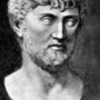Lucretius

Lucretius
Titus Lucretius Caruswas a Roman poet and philosopher. His only known work is the epic philosophical poem De rerum natura about the tenets and philosophy of Epicureanism, and which is usually translated into English as On the Nature of Things...
NationalityRoman
ProfessionPoet
death generations may
You may complete as many generations as you please during your life; none the less will that everlasting death await you.
doubt void wander
For there is a VOID in things; a truth which it will be useful for you, in reference to many points, to know; and which will prevent you from wandering in doubt.
world states whole-world
Time changes the nature of the whole world; Everything passes from one state to another And nothing stays like itself.
science men air
See with what force yon river's crystal stream Resists the weight of many a massy beam. To sink the wood the more we vainly toil, The higher it rebounds, with swift recoil. Yet that the beam would of itself ascend No man will rashly venture to contend. Thus too the flame has weight, though highly rare, Nor mounts but when compelled by heavier air.
passion harm divorced
Lucretius, who follows [Epicurus] in denouncing love, sees no harm in sexual intercourse provided it is divorced from passion.
suicide pain insanity
Lucretius was passionate, and much more in need of exhortations to prudence than Epicurus was. He committed suicide, and appears to have suffered from periodic insanity - brought on, so some averred, by the pains of love or the unintended effects of a love philtre.
stars light atheism
Epicurus ... whose genius surpassed all humankind, extinguished the light of others, as the stars are dimmed by the rising sun.
doe admire mankind
There is nothing that exists so great or marvelous that over time mankind does not admire it less and less.
sea land wind
It is pleasurable, when winds disturb the waves of a great sea, to gaze out from land upon the great trials of another.
duration
By protracting life, we do not deduct one jot from the duration of death.
goddess charm immortal
O goddess, bestow on my words an immortal charm.
moon men sky
If atom stocks are inexhaustible, Greater than power of living things to count, If Nature's same creative power were present too To throw the atoms into unions - exactly as united now, Why then confess you must That other worlds exist in other regions of the sky, And different tribes of men, kinds of wild beasts.
work mean men
Vineyards and shining harvests, pastures, arbors, And all this our very utmost toil Can hardly care for, we wear down our strength Whether in oxen or in men, we dull The edges of our ploughshares, and in return Our fields turn mean and stingy, underfed, And so today the farmer shakes his head, More and more often sighing that his work, The labour of his hands, has come to naught.
grief sleep matter
If the matter of death is reduced to sleep and rest, what can there be so bitter in it, that any one should pine in eternal grief for the decease of a friend?